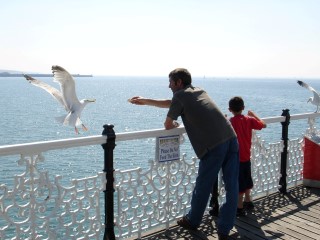When planning to travel outside the US, it's
important to review government posted travel warnings.
At times, some places are completely safe while at others times they
should be avoided.
Sometimes, in spite of
all your careful planning, things
will still go wrong during your trip.
For Emergency Help
Contact
the nearest U.S. embassy.
-or call- |
|
USA/Canada |
Overseas |
|
888-407-4747 |
202-501-4444 |
|
|
|
|
 Avoid
trouble by doing your best to obey local signs and laws, unlike this guy. Avoid
trouble by doing your best to obey local signs and laws, unlike this guy.
 |
|
Brighton Pier - Brighton, Englandghton, England |
- Sign Reads
- "Please Do Not Feed The Birds"
|
The
US Department of State
Bureau of Consular Affairs website
contains links to valuable information keeping you informed of
issues abroad as well as tips on
remaining safe during your travels. We have listed some of
the important topics here and encourage you to browse their website for
additional information.
The mission of the Department of State's
Bureau of Consular Affairs is to protect the lives and serve the
interests of U.S. citizens abroad. They provide information to help
you assess for yourself the risks of international travel and what
steps to take to ensure your safety when you decide to go abroad.
Before You Go
You can now access all safety and security information on one
country page. So before you travel, review the Travel Advisory and
Alerts for your destinations.
http://travel.state.gov/destination
Be
sure to read further country-specific details on the same page that
could affect your travel, such as entry/exit requirements, local
laws and customs, health conditions, transportation, and other
relevant topics. Research the locations you plan to visit prior to
planning your trip and again prior to departure.
|